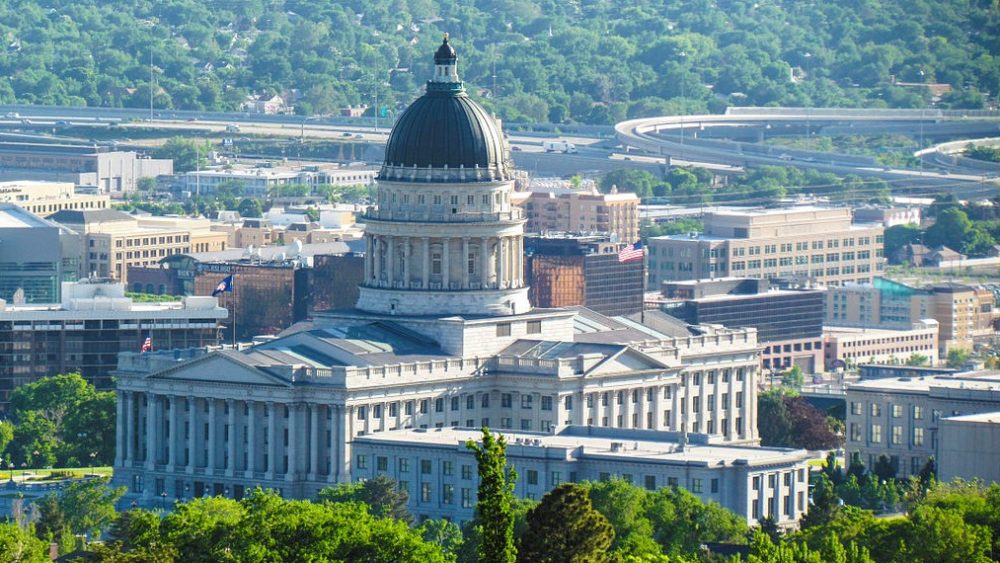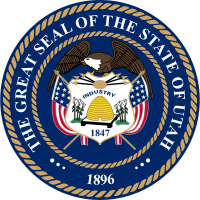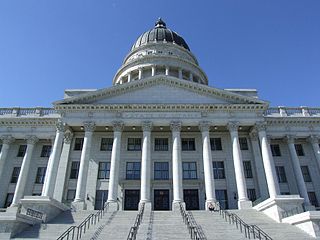February 13, 2020 •
Utah Congressional Vacancy Bill Progresses Over Objections

Utah Capitol Building - Jkinsocal
A compromise over filling congressional vacancies progressed on February 11, earning passage through the House on a party-line vote. House Bill 17 seeks to resolve years of dispute that began in 2017 with the resignation of former Rep. Jason Chaffetz. […]
A compromise over filling congressional vacancies progressed on February 11, earning passage through the House on a party-line vote.
House Bill 17 seeks to resolve years of dispute that began in 2017 with the resignation of former Rep. Jason Chaffetz. The state law was largely silent on the process for replacing members of Congress.
The legislative and executive branches have continued to disagree on the subject. Gov. Gary Herbert vetoed legislation last year that would have set a process for picking congressional replacements.
The current bill calls for the governor to issue a proclamation to schedule a primary and general election to fill a House vacancy.
Those elections generally would be held on the next municipal general election, a presidential primary or regular primary, or general election.
House Bill 17 is now in the Senate for consideration.
November 7, 2018 •
Utah Voters Approve Amendment C
Utah voters passed Amendment C allowing the Legislature to call itself into a special session. This came after Gov. Gary Herbert refused to call lawmakers to set a special election to fill the vacancy created by the departure of U.S. […]
 Utah voters passed Amendment C allowing the Legislature to call itself into a special session.
Utah voters passed Amendment C allowing the Legislature to call itself into a special session.
This came after Gov. Gary Herbert refused to call lawmakers to set a special election to fill the vacancy created by the departure of U.S. Representative Jason Chaffetz.
Amendment C will allow legislators to convene if two-thirds of the House and Senate agree it is necessary because of a fiscal crisis, war, natural disaster or emergency.
The amendment also allows the Legislature to hold a special session outside the Capitol if the building isn’t available.
Voters appear headed to approve Amendment C as unofficial vote totals show it winning 63.2 percent to 36.8 percent.
June 22, 2017 •
Utah Special Election Process Might Face Legal Challenge
The United Utah Party, a state party created at the end of May, will likely file suit to compel the Utah Elections Office to certify its candidate for the 3rd Congressional District after the office refused to permit the candidate […]
 The United Utah Party, a state party created at the end of May, will likely file suit to compel the Utah Elections Office to certify its candidate for the 3rd Congressional District after the office refused to permit the candidate to file provisionally before the United Utah Party’s qualified party status was certified.
The United Utah Party, a state party created at the end of May, will likely file suit to compel the Utah Elections Office to certify its candidate for the 3rd Congressional District after the office refused to permit the candidate to file provisionally before the United Utah Party’s qualified party status was certified.
The United Utah Party and Utah lawmakers are unhappy with the special election process and timeline Gov. Gary Herbert has chosen for the special election to replace Rep. Jason Chaffetz. Lawmakers originally wanted a special session of the Legislature to clarify the process as none is set by state law, but Gov. Herbert refused.
Utah House leaders reached out to State Attorney General Sean Reyes for a legal opinion on whether Gov. Herbert’s process was valid, but Gov. Herbert moved to block the opinion stating the Attorney General represents his office and not the Legislature.
Utah law establishes a 300-day process for a special election to fill a congressional vacancy. Lawmakers and state and local officials are concerned the abbreviated timeline Gov. Herbert set for this special election violates the law and could be rejected with high costs to counties who will start mailing primary ballots by the end of the month.
Rep. Jason Chaffetz will remain in office until June 30, 2017. The Governor’s office believes the process is legal and has approval from the U.S. Department of Justice and Congress.
May 2, 2017 •
Party Leaders Ask Utah Governor for Special Session
On April 27, leaders of the Utah Republican and Democratic parties sent a joint letter to Gov. Gary Herbert requesting a special session to clarify state law on calling a special election for a U.S. House member midterm. Utah Rep. […]
 On April 27, leaders of the Utah Republican and Democratic parties sent a joint letter to Gov. Gary Herbert requesting a special session to clarify state law on calling a special election for a U.S. House member midterm.
On April 27, leaders of the Utah Republican and Democratic parties sent a joint letter to Gov. Gary Herbert requesting a special session to clarify state law on calling a special election for a U.S. House member midterm.
Utah Rep. Jason Chaffetz announced he will not run for office in 2018, and will likely step down before his current term ends. Current law says the governor shall call a special election for a U.S. House vacancy, but does not lay out any details for the process.
Gov. Herbert does not believe a special session is necessary and believes some state lawmakers could have a vested interest in amending the law in order to increase their own chances to win the seat.
Members of the Legislature stated they want to offer their perspective to Herbert to show it is a bipartisan effort to work towards a process needing to be put in place.
State and Federal Communications, Inc. provides research and consulting services for government relations professionals on lobbying laws, procurement lobbying laws, political contribution laws in the United States and Canada. Learn more by visiting stateandfed.com.

